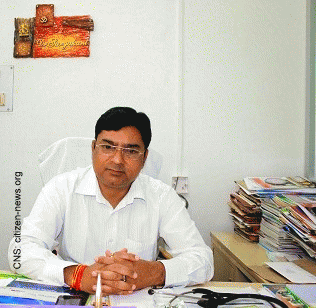
Dr Surya Kant, Head, Pulmonary Medicine, KGMU
(Image by Citizen News Service - CNS: citizen-news.org) Details DMCA
Just a few days before World Cancer Day this year, an acquaintance of mine succumbed to this dreaded disease within 10 months of diagnosis, and became part of the world statistics of someone dying somewhere of lung cancer every 30 seconds. Of all known cancers, lung cancer has highest annual mortality (1.6 million) as well as incidence (1.8 million) globally, and is responsible for nearly 1 in 5 cancer-related deaths.
I met Ismail (name changed) at King George's Medical University (KGMU) Lucknow, where he had come for his 1st cycle of chemotherapy. An avid smoker since the age of 18, Ismail looked emaciated and much older than his 42 years. In January 2014, he felt severe pain in his limbs and bones that later spread to the chest. He was diagnosed with TB and completed the 6 months' treatment regimen from the DOTS centre in his hometown. But when his condition did not improve, he was referred to KGMU, where he was diagnosed with stage 3B of lung cancer in November 2014.
"This delay in diagnosis is often the bane of lung cancer patients and costs them dearly," says Dr Surya Kant, Head of the Pulmonary Medicine Department at KGMU, and Vice-President of Indian Chest Society. "Diagnosis of lung cancer is very difficult and often delayed as its symptoms closely mimic those of TB. In our country two-thirds of cases of lung cancer are misdiagnosed as TB at the first go. So by the time patients come to our hospital, they have already wasted at least 6 months on unnecessary TB treatment, during which time the cancer advances from its operable to non-operable stage. If Ismail had been diagnosed 6 months earlier in the operable stage of his cancer, he had better survival chances. But in our country only 10% patients are diagnosed in the operable 1st and 2nd stages of lung cancer. Timely surgery results in 5 years' survival in 50% of the patients.
"Then again, at times treatment is also delayed due to several myths prevalent in our society--like biopsy will make the tumour spread, or that chemotherapy is very toxic and it is better to die than undergo it, or some faith/fake healer promises to heal cancer without surgery and chemotherapy", added Dr Kant. Dr Kant was conferred the prestigious Dr Lachman Cancer Awareness and Research Award recently at 79th Annual Conference of Indian Medical Association (IMA). He is also a distinguished recipient of Hukum Chandra Jain Cancer Awareness Award.
According to 63 years old Rakesh (name changed), who is suffering from stage 3B of lung cancer, the name alone of this dreaded disease is enough to kill a patient. Rakesh suffered from breathlessness and chest pain in 2005. He was diagnosed with pleurisy as well as diabetes and put on treatment. Then, one day in March 2014, he suddenly lost his voice. "I showed myself to a local ENT specialist and was put on a heavy dose of antibiotics. The doctor said that I needed to be operated upon as it was an incurable disease and I was referred to this Medical College. I have never smoked but was addicted to chewing tobacco/paan since past 30 years."
Rakesh was in the hospital for his 8th chemotherapy cycle with one more to go. (Dr Kant informed that usually patients are administered 6 cycles of chemotherapy--which could extend to 9--at intervals of 3 weeks). Rakesh was happy that he had at least got his voice back and was also able to walk by himself. But how long he would survive is anybody's guess.
Dr Kant explained that are 3 parameters on which to rate the cancer--tumour size (T), formation of lymph nodes (N), and metastatis (M)--the TNM classification. Once node formation and/or metastatis (spread of cancer to other parts) occurs, the tumour becomes inoperable and life expectancy is drastically reduced. If size of the tumour is 7cm or more it becomes inoperable. But even very small tumours of 2 cm may become inoperable if metastatic. The time in which the tumour gets doubled in volume is called doubling time and it could range from 1 to 6 months.
In India there were an estimated 71000 cases (54000 in males and 17000 in females) and 64,000 deaths (49000 in males and 15000 in females) of lung cancer in 2012, thereby suggesting a slightly better survival rate in females. However Dr Kant, who recently got the 'Cancer Awareness Award' for a second time from the UP Chapter of India Medical Association, feels that the actual figures would be much higher.
(Note: You can view every article as one long page if you sign up as an Advocate Member, or higher).





